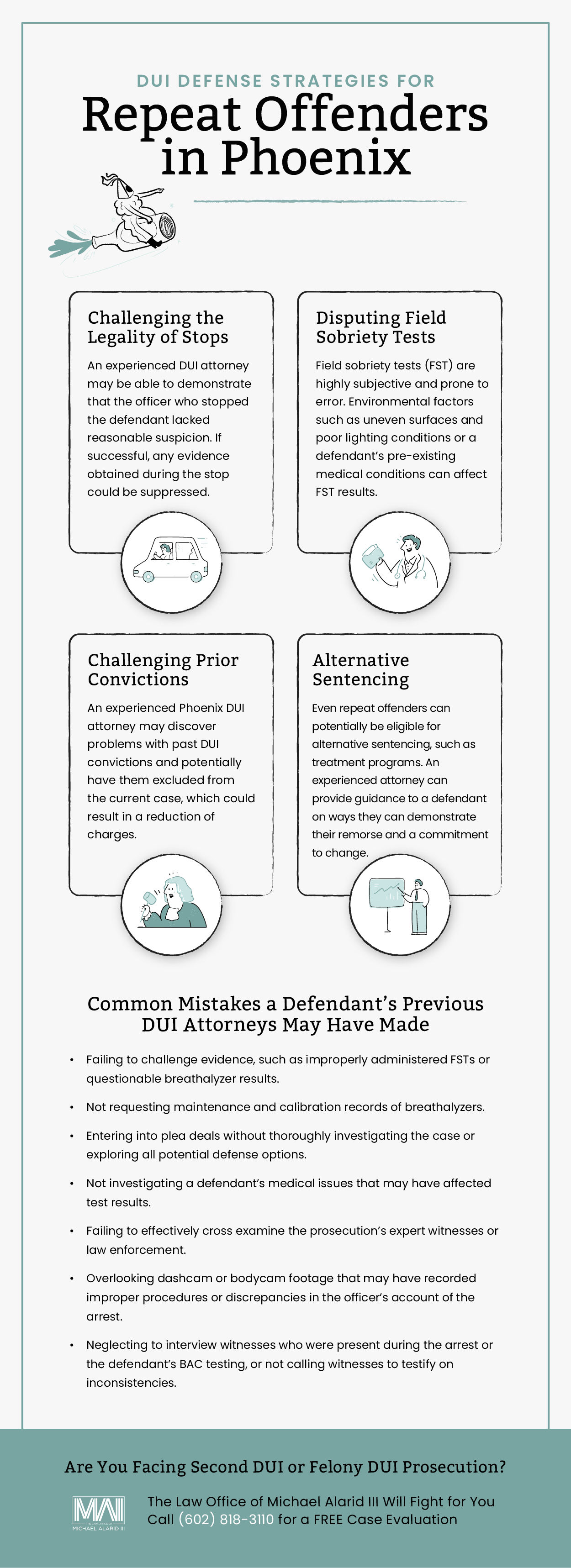How a Criminal Defense Attorney May Adjust Their Strategy for Repeat DUI Cases

The repercussions of a second, third or subsequent DUI conviction are much harsher than first-time DUI convictions. For example, a second offense DUI may result in more jail time and higher fines than a first offense extreme DUI, even if the driver is stopped with a BAC between 0.15 and 0.19.
Second-offense DUI defendants may be eligible for reductions in the mandatory 30-day jail term if they complete court-ordered treatment programs. However, they may still face higher fines and a one-year license suspension rather than the 90-day license suspension for a first offense DUI.
The consequences ratchet up significantly for a third DUI offense (aggravated DUI) within seven years of two prior DUIs. Felony DUI sentencing includes a minimum of four months of jail time, two years of driving with an ignition interlock device, and a minimum one-year license revocation. Drivers convicted of aggravated DUI may also face permanent vehicle forfeiture.
Some DUI defense strategies are relevant regardless of the number of past DUIs a defendant has on their record. However, the priorities and goals of a DUI defense attorney may be different in a second offense or felony DUI case.
Challenging Past Convictions
Prosecutions of second or aggravated DUIs rely heavily on prior convictions. In other words, if a defendant’s first DUI is not considered, their second DUI prosecution will be treated like a first offense DUI.
Challenging the legal criteria of a past conviction, or pursuing post-conviction relief, may potentially lead to reduced charges, more leniency during sentencing, or a better position for plea negotiations for a defendant’s current case.
Plea Bargaining Strategies
The harsher penalties attached to second or third offense DUIs may lead a DUI defense attorney to recommend a more aggressive plea bargaining strategy. A key goal in plea negotiations is often to reduce the charge to a lesser offense, like reckless driving, or seek alternative sentencing options such as rehab or house arrest.
Plea bargaining can be an important component of a first offense DUI defense strategy, but those negotiations are often more focused on reducing fines or the length of license suspensions rather than jail time.
Demonstrating a Commitment to Treatment
Although voluntary rehabilitation can be valuable from a defense standpoint in a first offense DUI case, it can be particularly vital for subsequent DUI offenses. Entering a rehabilitation program voluntarily may show the court that the defendant is taking responsibility for their behavior, potentially leading to more lenient sentencing.
The effectiveness of this strategy can vary depending on the number of previous offenses and the defendant’s broader criminal history. The court will be more likely to impose harsher penalties if a defendant shows no interest in addressing underlying substance abuse issues, or if past behavior calls into question the sincerity of current efforts at rehabilitation.
Investigating Procedural Mistakes in Past Arrests
Overworked public defenders or inexperienced private practice criminal lawyers might fail to:
- Question the legality of the traffic stop
- Request all evidence
- Challenge the field sobriety test
- Effectively cross examine the officers involved
- Make other types of mistakes during a DUI investigation, defense or plea negotiation
An Arizona Board-Certified Criminal Defense Specialist or a National Board-Certified DUI Specialist may uncover procedural violations or due process issues while investigating your past DUI cases.
Experience can make a difference in DUI cases. Identifying past errors can be crucial, especially if your future depends on your attorney’s ability to spot small mistakes that could be used to your advantage.
Challenging the legitimacy of prior convictions can have several potential benefits beyond simply turning a second DUI prosecution into a first DUI prosecution. A DUI attorney who asks the right kinds of questions or aggressively probes matters the state believed were settled may hold a better hand in plea negotiations. These advantages may make a prosecutor or judge more amenable to alternative sentencing options.
Outright overturning past convictions isn’t always necessary for a DUI defense attorney’s investigation to have a positive impact on the sentencing or plea negotiations in a defendant’s current case.
Felony vs. Misdemeanor DUI
Although a second offense DUI conviction does carry harsher penalties in Arizona, it is still technically charged as a misdemeanor. This typically applies to second offense extreme and super extreme DUIs as well.
A third DUI offense, or aggravated DUI, will be prosecuted as a felony, regardless of BAC at the time of arrest. A felony DUI carries harsher sentencing guidelines, including time in a state or federal prison, much higher fines, and the loss of some civil rights.
One of the goals of a DUI defense attorney in an aggravated DUI case may be to have the charges reduced from a felony DUI to a misdemeanor offense, such as reckless driving or endangerment. It typically isn’t possible to reduce an aggravated DUI to a misdemeanor without having it recategorized as a lesser offense.
Facing additional drunk driving charges after one or more past DUI convictions can be harrowing for defendants in Phoenix. While retaining experienced legal representation is critical for any DUI case, it is especially vital for those facing second offense or felony DUIs.
Michael Alarid III is Board-Certified in DUI Defense through the National College for DUI Defense (NCDD) and an Arizona Board-Certified Specialist in Criminal Law. He can explain the potential ramifications of the charges you’re facing and explain some of the potential ways in which they can be combated.
Call our office today at (602) 818-3110 to request a free consultation.




